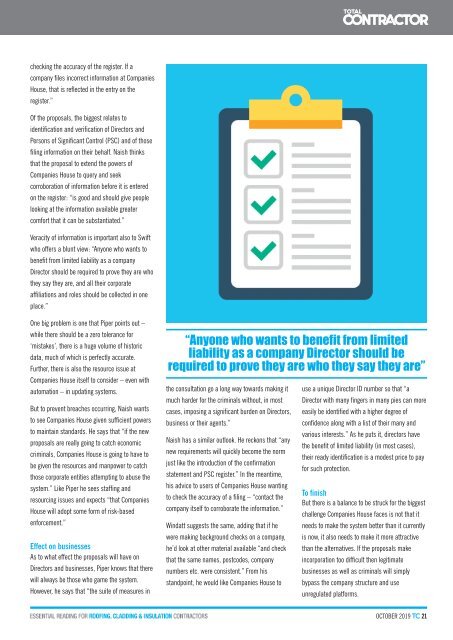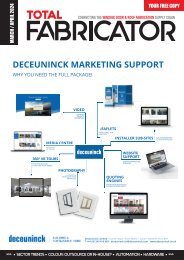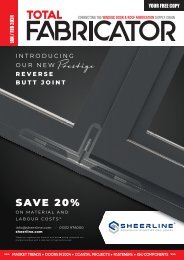October 2019
You also want an ePaper? Increase the reach of your titles
YUMPU automatically turns print PDFs into web optimized ePapers that Google loves.
checking the accuracy of the register. If a<br />
company files incorrect information at Companies<br />
House, that is reflected in the entry on the<br />
register.”<br />
Of the proposals, the biggest relates to<br />
identification and verification of Directors and<br />
Persons of Significant Control (PSC) and of those<br />
filing information on their behalf. Naish thinks<br />
that the proposal to extend the powers of<br />
Companies House to query and seek<br />
corroboration of information before it is entered<br />
on the register: “is good and should give people<br />
looking at the information available greater<br />
comfort that it can be substantiated.”<br />
Veracity of information is important also to Swift<br />
who offers a blunt view: “Anyone who wants to<br />
benefit from limited liability as a company<br />
Director should be required to prove they are who<br />
they say they are, and all their corporate<br />
affiliations and roles should be collected in one<br />
place.”<br />
One big problem is one that Piper points out –<br />
while there should be a zero tolerance for<br />
‘mistakes’, there is a huge volume of historic<br />
data, much of which is perfectly accurate.<br />
Further, there is also the resource issue at<br />
Companies House itself to consider – even with<br />
automation – in updating systems.<br />
But to prevent breaches occurring, Naish wants<br />
to see Companies House given sufficient powers<br />
to maintain standards. He says that “if the new<br />
proposals are really going to catch economic<br />
criminals, Companies House is going to have to<br />
be given the resources and manpower to catch<br />
those corporate entities attempting to abuse the<br />
system.” Like Piper he sees staffing and<br />
resourcing issues and expects “that Companies<br />
House will adopt some form of risk-based<br />
enforcement.”<br />
Effect on businesses<br />
As to what effect the proposals will have on<br />
Directors and businesses, Piper knows that there<br />
will always be those who game the system.<br />
However, he says that “the suite of measures in<br />
“Anyone who wants to benefit from limited<br />
liability as a company Director should be<br />
required to prove they are who they say they are”<br />
the consultation go a long way towards making it<br />
much harder for the criminals without, in most<br />
cases, imposing a significant burden on Directors,<br />
business or their agents.”<br />
Naish has a similar outlook. He reckons that “any<br />
new requirements will quickly become the norm<br />
just like the introduction of the confirmation<br />
statement and PSC register.” In the meantime,<br />
his advice to users of Companies House wanting<br />
to check the accuracy of a filing – “contact the<br />
company itself to corroborate the information.”<br />
Windatt suggests the same, adding that if he<br />
were making background checks on a company,<br />
he’d look at other material available “and check<br />
that the same names, postcodes, company<br />
numbers etc. were consistent.” From his<br />
standpoint, he would like Companies House to<br />
use a unique Director ID number so that “a<br />
Director with many fingers in many pies can more<br />
easily be identified with a higher degree of<br />
confidence along with a list of their many and<br />
various interests.” As he puts it, directors have<br />
the benefit of limited liability (in most cases),<br />
their ready identification is a modest price to pay<br />
for such protection.<br />
To finish<br />
But there is a balance to be struck for the biggest<br />
challenge Companies House faces is not that it<br />
needs to make the system better than it currently<br />
is now, it also needs to make it more attractive<br />
than the alternatives. If the proposals make<br />
incorporation too difficult then legitimate<br />
businesses as well as criminals will simply<br />
bypass the company structure and use<br />
unregulated platforms.<br />
OCTOBER <strong>2019</strong> TC 21

















